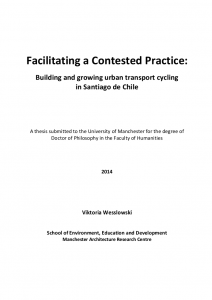The research presented here is a summary of my PhD research, which I undertook from September 2009 to April 2014 at the School of Environment, Education and Development at the University of Manchester. The free full text version of my thesis can be downloaded from the University of Manchester by clicking on the title page below.
My research was motivated by the question how to facilitate a change in what people do, their everyday routine practices. Climate change, environmental degradation, traffic congestion, noise pollution and the increase in obesity are all challenges of our times that fundamentally link to the way we organise our lives, our everyday routines. How can we reduce water consumption, increase walking and cycling in urban centres, protect public parks from littering and increase household waste recycling?
Practice theory argues that it is not about encouraging, convincing or nudging people to choose to behave in a more sustainable way. Rather, practice theory suggests that the way we organise our lives is a complex bundle of practices, based on the shared understanding of the meaning of what we do and why. Practices are furthermore mediated through technology and material infrastructure. Changing one practice has consequences for a multitude of others. The practice approaches thereby show that interventions in practices – or behaviour change as it is often termed – is far more complicated than providing information or changing individual attitudes.
My research aimed to achieve a better understanding of interventions in these everyday routine practices. It was based on a case study of urban transport cycling in Santiago de Chile. The research used a practice approach combined with concepts from Science and Technology Studies in order to explore the practice of transport cycling and examine interventions aimed at increasing the modal share of cycling in Santiago. The research was based on qualitative data from semi-structured interviews, participant observation, photography and document analysis.

Thesis title page. Click to download free full text version via The University of Manchester. Please respect copyright and cite appropriately.
Cycling as a Contested Practice
While transport cycling is a recognisable practice in Santiago, it is also the site of several conflicts. The stigmatisation of cycling in its recent history as mode of transport for the most marginalised part of the urban population is challenged by new images of cycling as environmentally-friendly, healthy mode of transport for young professionals. As cycling becomes more popular, conflicts over the location of cycling emerge with motorists as well as pedestrians. Finally, different performances and understandings of cycling have generated conflicts among the urban transport cyclists. By focusing on relations between practices, the research thereby brings to the forefront the contested
nature of practices which has so far been underemphasised in practice research.
Interventions
The research then focuses on interventions in the trajectory of urban transport cycling in Santiago, how they are developed and how they take effect. The research identifies two categories of interventions: building practice and growing practice. Building practice is the government-led provision of material infrastructure for cycling, while growing practice is led by civil society and includes a variety of small-scale interventions in the everyday engagement in the practice.
The research argues that building practice produces infrastructure which is developed within the dominant system of automobility and is shaped by and reflects the inherent conflicts of the practice. Growing practice interventions are shaped by the core of the community of practice. They do not only provide targeted support for individuals, but more importantly contribute to the creation of a community of practice.
